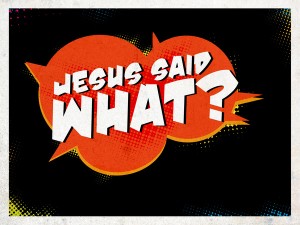From Matthew’s Gospel:
Jesus said, “Not everyone who says to me, ‘Lord, Lord’, will enter the kingdom of heaven, but only one who does the will of my Father in heaven.”
(From the Daily Office Lectionary – Matthew 7:21 (NRSV) – May 24, 2014)
 I love this verse! I always think of it as Jesus’ version of “Don’t just stand there. Do something!”
I love this verse! I always think of it as Jesus’ version of “Don’t just stand there. Do something!”
If I could point to one bit of Holy Scripture that convinced me to become an Episcopalian, it would be this one. The King James Version’s rendition was the favorite offertory sentence of the Episcopal chaplain at the military academy where I went to high school and attended Evening Prayer or the Holy Eucharist everyday. I can still recite that version from memory: “Not every one that saith unto me, Lord, Lord, shall enter into the kingdom of heaven; but he that doeth the will of my Father which is in heaven.”
My childhood was largely an unchurched one. My earliest memories of going to church were in a Baptist congregation which eventually we ceased attending when the pastor declined to bury my non-church-member father (whose hard-drinking, Las-Vegas-Strip lifestyle he found objectionable); no more churchgoing after that. Summers were spent with my paternal grandparents who insisted that I go with them to an old-timey, very evangelical Methodist Church. The message at both those churches, so far as understood (and now remembered) by a grade school kid, was that all you needed to do to be “saved” was to claim Jesus as Lord and talk about him a lot. I never heard anything like this verse from Matthew and, by the time I was in junior high and no longer going to church with my grandparents, the talking-about-Jesus thing had worn a bit thin.
The liturgical worship of the Episcopal Church (back then, the 1928 Book of Common Prayer) resonated with me. I do have to admit that the first few weeks of attending daily chapel I was less aware of the words than of the rhythm of worship because I was getting used to the “Episcopal juggle” — when to use the prayer book, when to use the hymnal, when to use the service sheet or “bulletin” — and Episcopal calisthenics — when do I kneel? when do I stand? do I ever get to just sit still? But eventually the words started making an impact and the words of the chaplain’s favorite offertory sentence — “Not every one that saith unto me, Lord, Lord, shall enter into the kingdom of heaven; but he that doeth the will of my Father which is in heaven” — made a particular impact.
In addition to learning about the liturgy of the Episcopal Church, I was learning about the culture of the Episcopal Church. It was the 1960s. John Hines was Presiding Bishop; he was contributing to the Angela Davis Defense Fund! Episcopalians were marching with Martin Luther King, Jr. One of them, a seminarian named Jonathan Myrick Daniels, was shot and killed by a deputy sheriff in Alabama when Daniels moved to protect a 17-year-old black girl. (Daniels is now recognized as a martyr on the church’s sanctoral calendar.) Some Episcopalians were active in protesting the Vietnam War, while other Episcopalians served as chaplains in the military and were stationed in Vietnam — but both respected the other, worshipped together, and worked out their differences, whatever they may have been, through the church’s conciliar governance at diocesan and national (general) conventions.
I was captivated by the culture of the 1960s Episcopal Church. These weren’t people who simply claimed Jesus as Lord and talked about him a lot; these people did things! I joined, and as I got more active I found out Episcopalians did “smaller,” less noticed things — things like feeding the hungry, providing shelter for the homeless, opening their churches for free community concerts, tutoring kids struggling in school, teaching English to refugees from other countries — the list of things Episcopalians do, things I hadn’t seen in my parents’ and grandparents’ churches (although now I’m pretty sure they did at least a few of them; I hope they did), is long, almost endless.
It is my joy to be rector of a parish with an active food pantry ministry, a parish which opens its space each month for a free concert, a parish whose youth sleep outside in all sorts of whether to call attention to the plight of those without homes, a parish where youth and adults travel somewhere together every summer to build or repair the homes of those unable to do it themselves, a parish which doesn’t just call Jesus “Lord” but which actively does the things he told us were his Father’s will.
There are many, many reasons I became, and stay, an Episcopalian. An important one is that Episcopalians don’t just stand there — they do something!
====================
A request to my readers: I’m trying to build the readership of this blog and I’d very much appreciate your help in doing so. If you find something here that is of value, please share it with others. If you are on Facebook, “like” the posts on your page so others can see them. If you are following me on Twitter, please “retweet” the notices of these meditations. If you have a blog of your own, please include mine in your links (a favor I will gladly reciprocate). Many thanks!
====================
Father Funston is the rector of St. Paul’s Episcopal Church, Medina, Ohio.



Leave a Reply